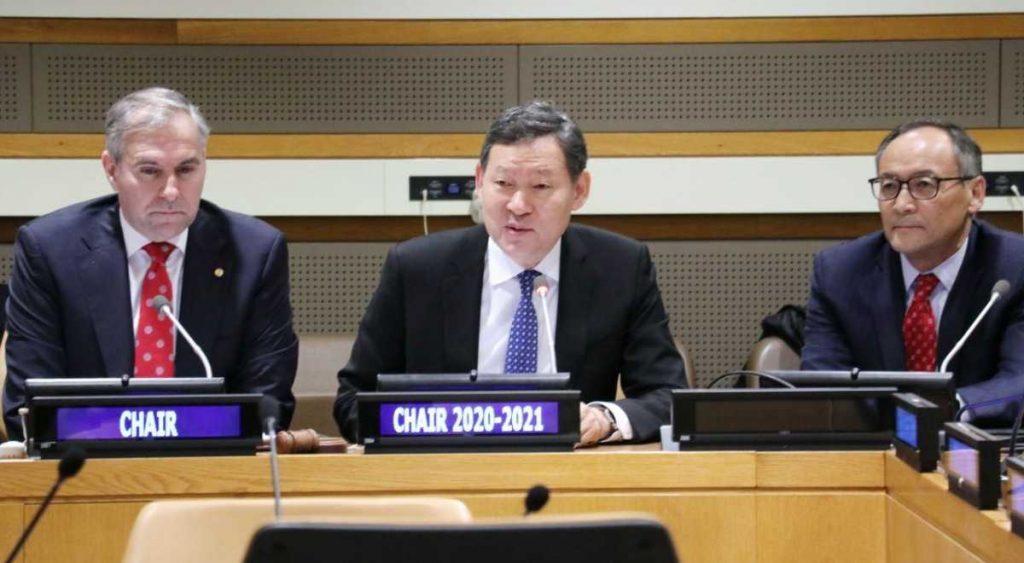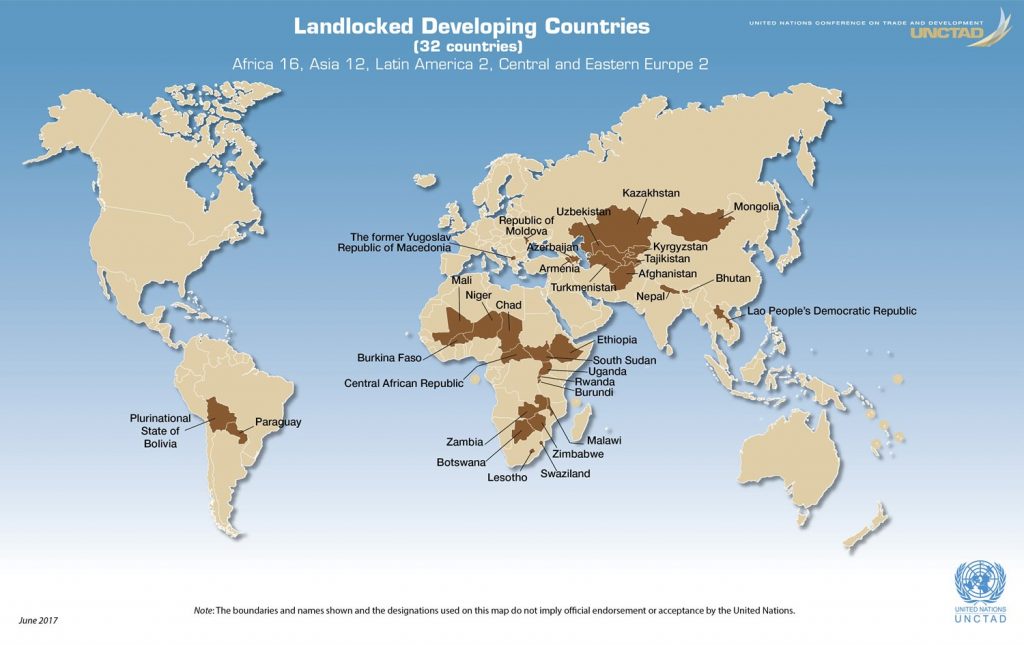Kazakhstan Now Chairs the Group of Landlocked Developing Countries
Recent Articles
Author: Josephine Freund
01/30/2020
On January 13, 2020, Kazakhstan assumed the role of chairman of UNCTAD’s Group of Landlocked Developing Countries (LLDC) for 2020-2021. The group promotes the interests of 32 landlocked states, including the five countries of Central Asia as well as Afghanistan, Armenia, and Azerbaijan. Since landlocked countries often face particular challenges from their lack of access to the world’s oceans and open seas, challenges that include a sense of isolation and over-dependence on neighbors as well as higher transport costs and other trade and economic/business issues, this group in the UN Conference on Trade and Development (UNCTAD) was organized to help such countries with economic and political advocacy.
Kazakhstan is the world’s largest landlocked country. The chairmanship will allow Kazakhstan to further its efforts in promoting regional stability and progress as well as increased regional connectivity and economic growth. As Chair, Kazakhstan will lead the group’s work to ensure it and the other 31 landlocked countries move forward with the Vienna Program of Action for LLDCs (2014-2024) and the UN Sustainable Development Goals. Because of Kazakhstan’s strategic geographic position between Europe and China as well as between Europe and South Asia, developing and expanding transit networks have been a top focus for the country. To further develop its potential as a transit link with these regions, Kazakhstan has been improving and expanding its railways and highway system.

Photo credit: The Ministry of Foreign Affairs, Republic of Kazakhstan
The Group of LLDCs seeks to help land-locked developing states achieve greater independence and clout through the improvement of infrastructure, transport machinery and routes, and economic development. Ideally, others in the region will benefit from Kazakhstan’s role as this year’s Chair. After all, each of the states in the Greater Caspian region stands to grow economically from the improvements the others make in transport and other means of connectivity.
For example, Kyrgyzstan has previously acknowledged its commitment to improve policies regarding transit transport, transport infrastructure, energy and information and communications technology (ICT) infrastructure, international trade and trade facilitation, and regional integration. Since Kyrgyzstan has already shown commitment to improve in these areas which are in line with the Group of LLDC’s aims, the outlook for cooperation looks positive. One particular area, like several of its neighbors, Kyrgyzstan struggles with is the efficiency of its transportation networks This is something that has to be addressed if the New Silk Road/BRI is to achieve its potential. Today, Kyrgyzstan’s railroads are not adequately connected to other cities within the country nor to other countries. The Group of LLDCs’ attention to this issue could boost opportunities for trade within the region and beyond.
Tajikistan, further to this point, has seen its transportation sector as a path for economic development and the increasingly developed road networks, which now extend to China, Kyrgyzstan, Afghanistan, and Uzbekistan, a way to offset its landlocked and otherwise isolated position. For Tajikistan the Group of LLDCs can also help strengthen its connections with neighbors’ electrical grids, thereby improving its own and the region’s economic well-being and security.
Another important set of developments among the land-locked states of Central Asia are the changes underway in Uzbekistan since Shavkat Mirziyoyev became president and ended the country’s isolationism. Under Mirziyoyev’s presidency, Uzbekistan has undertaken numerous political and social changes, especially regarding cooperation with neighbors. The Group of LLDCs could help Uzbekistan drive regional cooperation, including through facilitating foreign investment, a key tenant of this group’s strategy.
Kazakhstan’s assumption of the Group of LLDCs chairmanship is thus a chance to advance its own progress and development as well as to further its foreign policy ambitions. The country has made great strides in overcoming its landlocked position, including by seeking to become an important partner for regional cooperation, trade, and transportation. Since Kazakhstan has emphasized strengthening implementation of the Vienna Program of Action for LLDCs, the other Central Asian countries as well as Kazakhstan should benefit. The Vienna Program of Action for LLDCs (2014-2024) aims to remedy poverty and other development issues faced by landlocked countries through fundamental transit policy actions, infrastructure development and maintenance, international trade and trade facilitation measures, regional integration and cooperation, and structural economic transformation. Kazakhstan’s success in implementing this plan can provide useful examples to other countries as well as pulling the region as a whole forward.

Map of Landlocked Developing Countries (LLDCs). Credit: United Nations Conference on Trade and Development